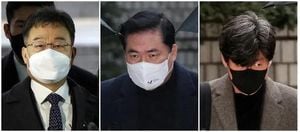On June 26, 2025, South Korean President Lee Jae-myung made significant nominations that signal a fresh chapter for the nation’s Constitutional Court and tax administration. Among the key appointments were Kim Sang-hwan, a former Supreme Court Justice, as the candidate for Constitutional Court Chief Justice, and Oh Young-jun, a seasoned senior judge at the Seoul High Court, as a candidate for Constitutional Court Justice. Additionally, Lim Kwang-hyun, a first-term lawmaker with deep expertise in taxation, was nominated as the commissioner of the National Tax Service.
These nominations were publicly announced by Presidential Chief of Staff Kang Hoon-sik at a briefing held at the Yongsan Presidential Office. Kang emphasized the importance of these appointments as the new government’s first steps toward restoring stability and public trust in the Constitutional Court, which had faced turbulence in recent years.
Kim Sang-hwan, the nominee for Constitutional Court Chief Justice, is widely recognized for his profound expertise in constitutional and legal theory. Born in Daejeon, he graduated from Daejeon Bomo High School and then from Seoul National University Law School. He completed the 20th Judicial Research and Training Institute and served as a Constitutional Researcher and Research Director at the Constitutional Court. His judicial career spans approximately 24 years, including tenure as a Supreme Court Justice and Chief of the National Court Administration. Currently, he holds a distinguished professorship at Jeju National University Law School.
Chief of Staff Kang described Kim as "someone who is deeply knowledgeable in constitutional and legal theory" and who will "enhance insight in constitutional interpretation based on a deep understanding of our society." His experience handling major judgments, such as the case involving former National Intelligence Service Director Won Se-hoon, attests to his judicial proficiency and practical acumen.
Alongside Kim, Oh Young-jun was nominated as a Constitutional Court Justice. Born in 1969 in Daejeon, Oh is a graduate of Seoul High School and Seoul National University Law School, where he completed the 23rd Judicial Research and Training Institute. His judicial career began in 1994 at the Seoul Civil District Court and has since spanned over 30 years, during which he has held pivotal roles across various courts.
Oh’s experience is notably comprehensive. He has served as a judge in the Seoul District Court’s Northern Branch and Jeonju District Court’s Gunsan Branch, as well as at the Uijeongbu Branch of Seoul District Court and the Patent Court. His tenure at the Supreme Court Research Department is particularly distinguished; he served as a Research Judge, Senior Research Judge, and ultimately as the Senior Research Judge, a role often dubbed the "Supreme Court’s brain" for its critical support of full bench decisions.
Within the judiciary, Oh is lauded as a 'powerhouse' with expertise spanning civil, criminal, intellectual property, and commercial law. Known for his thorough legal reasoning and rational judgments, he is respected for his impartiality and depth of knowledge. While his everyday speech is described as somewhat slow, his logic during debates is sharp and assertive, ensuring his legal opinions carry weight.
Throughout his career, Oh has been involved in high-profile cases, including the 'Nth Room' criminal case, the retrial of the National Democratic Youth Student Alliance (Mincheonghakryeon), the 'Donbong-gu Dinner' scandal involving former Seoul Central District Prosecutor Lee Young-ryeol, and the state affairs manipulation scandal linked to former Creative Economy Innovation Center Director Cha Eun-taek and Choi Seo-won. Even after concluding his Supreme Court service in 2022, he returned to the Seoul High Court to handle civil and administrative cases.
Oh’s judicial philosophy is influenced by his affiliation with the 'Our Law Research Society,' a progressive-leaning group within the judiciary. He also participated in the Civil Precedent Research Society, a collective of elite judges known for their scholarly contributions. His wife, Kim Min-ki, is a judge at the Suwon High Court and shares his progressive judicial background.
Oh was previously a final candidate for Supreme Court Justice appointments in 2022 and again in 2024 under the Yoon Seok-yeol administration but was not selected. His nomination to the Constitutional Court now represents a significant advancement in his judicial career.
President Lee’s appointments come as part of a broader effort to stabilize the Constitutional Court, which had seen two justices—Moon Hyung-bae and Lee Mi-sun—retire on April 8, 2025. The president expressed optimism about the new nominees, stating, "The great revolution of light made by our people is based solely on the spirit of the Constitution, and (the candidates) will now play a significant role in better interpreting the Constitution." He added, "He expects the people's hope for change to further enrich our Constitution."
Among the other nominees is Lim Kwang-hyun, a first-term Democratic Party lawmaker representing the proportional representation bloc. Lim, originally from Hongseong, Chungcheongnam-do, graduated from Yonsei University with a degree in Economics and completed an international taxation program at Harvard Law School. He passed the 38th Administrative Examination and has held key positions within the National Tax Service, including Investigation Bureau Chief, Seoul Regional Tax Office Chief, and Deputy Commissioner.
Lim’s background in taxation and his current role on the National Assembly’s Planning and Finance Committee position him as a knowledgeable candidate to lead the National Tax Service. Chief of Staff Kang noted that Lim would "contribute to fair tax administration and taxpayer protection based on his broadened perspective through his activities in the National Assembly."
The nomination process also included Lee Seung-yeop, a lawyer who once defended President Lee Jae-myung in legal cases. However, Lee withdrew his candidacy amid controversy over potential conflicts of interest related to his prior defense work involving election law violations and other allegations against the president.
These appointments mark a critical moment for South Korea’s judiciary and government administration. They reflect a commitment by President Lee’s administration to reinforce the independence and credibility of constitutional adjudication and to ensure competent leadership in tax administration. The emphasis on nominees with deep legal expertise, extensive judicial experience, and progressive legal thought signals an intention to navigate complex legal challenges with both rigor and fairness.
As the nation watches, these new leaders are expected to bring stability and renewed confidence to institutions vital for upholding the rule of law and ensuring equitable governance.
![[프로필]오영준 헌법재판관 후보자…수석재판연구관 지낸 실력파 : 네이트 뉴스](https://thumbor.evrimagaci.org/rkPkqnDz3J669_C2v-63LXaJe0g=/200x0/tpg%2Fsources%2F05dd9c5f-10b3-43b8-a11e-faf8c05c7f0e.jpeg)
![[프로필] 김상환·오영준·임광현 후보자](https://thumbor.evrimagaci.org/2rlosqUlE91LkC9RucH3F3wgiJQ=/200x0/tpg%2Fsources%2F1a40cd66-1b08-48f7-9892-b887a7a0ece0.jpeg)



